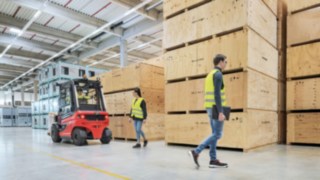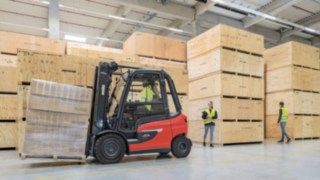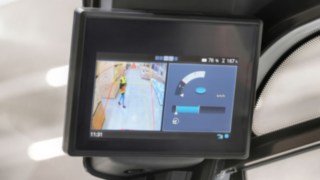
Intelligent camera avoids accidents involving people during forklift operations
18 Jul 2023
AI-based Reverse Assist Camera: a new addition to Linde MH’s safety portfolio
The new Linde Reverse Assist Camera from Linde Material Handling (MH) distinguishes people from objects in real time and uses a multi-level warning system to prevent collisions between industrial trucks and pedestrians in warehouse and production areas. Available both as a fully integrated solution on new vehicles and as a retrofit option, the intelligent reverse assist camera can be used on its own or combined with existing Linde assistance and safety systems.

There is now a new solution for one of the more safety-critical situations in material transport: The Linde Reverse Assist Camera prevents accidents involving people.

There is now a new solution for one of the more safety-critical situations in material transport: The Linde Reverse Assist Camera prevents accidents involving people.
“The issue of occupational safety now plays a prominent role in the vast majority of companies, and rightly so,” emphasizes Fabian Zimmermann, Product Manager Safety Solutions at Linde MH. “Time and again, accidents involving industrial trucks result in serious injuries, and quite a few are fatal. The causes are manifold and range from careless pedestrians and unfocused drivers to simply forgetting to look over the shoulder when the vehicle is reversing,” says Product Manager Zimmermann. “With our ‘Vision Zero’ concept, we have set ourselves the goal of completely avoiding accidents in the in-house flow of materials – especially those in which people are injured.” Investments in safety assistance systems pay off in more ways than one, because in addition to personal suffering, they help avoid costs and productivity losses and conserve management resources. “That’s why they usually pay for themselves quickly,” explains the Linde safety solutions specialist.
The intelligent reverse assistance camera is now being added to Linde MH’s already extensive range of safety assistance systems. Developed with the help of artificial intelligence, it has “learned” to distinguish people from other obstacles that appear in the rear area of the truck. If it detects a person at a defined angle around the camera, a multi-level warning system is triggered: The driver is alerted to the potential danger both visually via the display and via an acoustic warning signal. In addition, an automatic reduction in driving speed can be activated to further minimize the risk of an accident. “By having the algorithm target only the particularly critical collisions involving people, we prevent drivers from becoming desensitized and eventually immune to the warning signals,” says Zimmermann. To further reduce the number of such signals, the alarm settings can be limited to when the truck is actually traveling in the direction where people are present.

The new Linde Reverse Assist Camera is AI-based and can distinguish between people and objects. This allows for a reduction in the number of warning messages.

The new Linde Reverse Assist Camera is AI-based and can distinguish between people and objects. This allows for a reduction in the number of warning messages.
Warning in various stages and zones
The individually configurable person detection zone of the Linde Reverse Assist Camera covers up to 12 meters and can be divided into two warning zones. If the pedestrian is further away, the speed of the vehicle is reduced less than if the person is in the narrower zone and thus closer to the vehicle. On the latest generation of counterbalanced trucks, the camera images are displayed on the optional 7’’ display in either full-screen mode or on a split screen. With these models, the intelligent camera is fully integrated into the truck architecture. An additional monitor for the rear view camera, which could obstruct visibility in this area, is not required.

The new Linde Reverse Assist Camera is integrated into the optional 7’’ color display on the latest generation of trucks. In the split-screen setting, additional information is displayed alongside the camera image.

The new Linde Reverse Assist Camera is integrated into the optional 7’’ color display on the latest generation of trucks. In the split-screen setting, additional information is displayed alongside the camera image.
The Linde Reverse Assist Camera can be used as a stand-alone solution. However, since a single safety system is often insufficient to cover the wide range of operational risks, the solution is also compatible with other existing Linde safety and assistance systems. These include, for example, the “Linde Motion Detection” system, which prevents the truck from starting up if a person or vehicle is moving behind it. “The Reverse Assist Camera and the Linde Safety Guard assistance system represent an ideal combination as well,” says Zimmermann, referring to an application at a customer’s site. If the forklifts there drive from the outdoor area into the darker hall environment, the speed is automatically reduced and the door opens when the rolling door is reached. Additionally, a large warning triangle is projected onto the floor in the hall to alert pedestrians to the approaching forklift.

